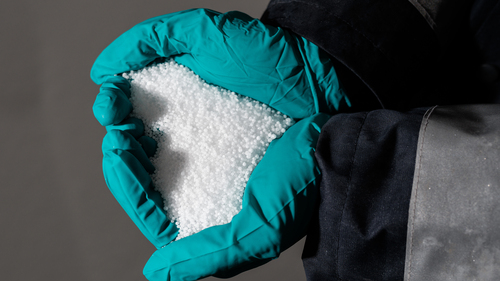BASF now offering first biomass-balanced products for its ammonia and urea portfolio.
With its first biomass-balanced (BMB) ammonia and urea products, BASF now offers BMB options within its ammonia value chain. The wide range of products includes ammonia anhydrous BMBcertTM, ammonia solution 24.5% BMBcertTM, urea prills BMBcertTM, urea solution 40% BMBcertTM, and urea solution 45% BMBcertTM.
BASF applies a biomass balance approach to replace fossil resources at the beginning of the production process with certified biowaste raw materials which are attributed to the products. The mass balanced products are certified according to ISCC (International Sustainability and Carbon Certification) PLUS standards. In addition, BASF is using electricity from renewable sources for the manufacturing of the ammonia and urea products, further reducing their production-related emissions.
These measures lower the product carbon footprint (PCF) of these products by at least 80% versus the average PCF of conventional fossil ammonia derivatives* without compromising on quality and performance. The certified BMBcertTM products enable customers to reduce their scope 3 emissions as well as the product carbon footprint of their products.
“BASF was the first company to develop both an industrial ammonia as well as an industrial urea process. Today, we are the first company that offers such biomass balanced options as part of the regular ammonia and urea portfolio. With this portfolio we meet the rising request in industry and help our customers reach their sustainability targets”, said Dr. Jens Aßmann, Vice President Business Management Ammonia Value Chain and Operations Amino Resins at BASF.
The BMB ammonia derivative portfolio is a further step on the sustainability roadmap of BASF’s Monomers division which was announced last year. This envisages developing at least one circular or lower PCF option for every major product line by 2025. The division’s sustainable offerings are an essential part of BASF’s path to climate neutrality and net-zero CO2 emissions by 2050.
* Based on the average CO2 footprints stated in the “Default values for the transitional period for the CBAM between October 1, 2023 and December 31, 2025” published by the European Commission on Dec 22, 2023.
Latest news
MSSA doubles production capacity for sodium methylate in La Rochelle, France
The strategic investment will double MSSA's annual production capacity for sodium methylate from 20,000 tonnes to 40,000 tonnes, reinforcing the company's commitment to meeting the growing demand f...
Dreexo Energy to Launch Circular Economy Plant in Cádiz, Advancing Sustainable Industry in Andalucía
Construction of a new facility in the Cádiz Free Trade Zone. The project is expected to break ground in early 2026 and be operational by year’s end.
BASF invests in new semiconductor-grade sulfuric acid plant in Ludwigshafen, Germany
BASF SE, Ludwigshafen →Essential ultra-pure chemical enabling advanced semiconductor manufacturing processes New capacity meets growing demand for the manufacturing of chips in Europe
Vioneo appoints Wood to design world’s first industrial scale fossil-free plastics facility in Antwerp, Belgium
Port Of Antwerp →the renewably powered and energy efficient plant will be the first facility in the world capable of achieving the production of fossil-free plastics using green methanol at an industrial scale.

